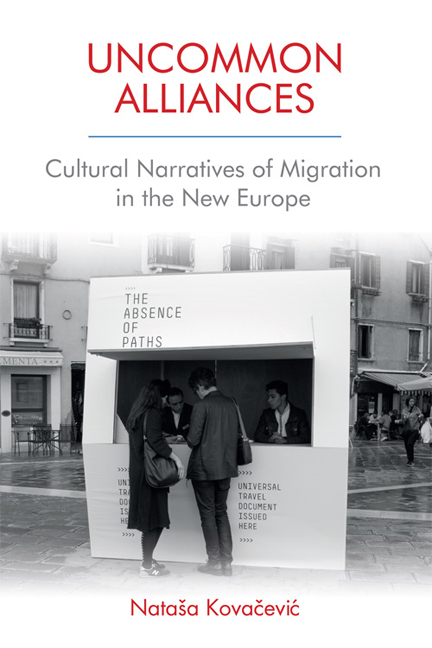Book contents
- Frontmatter
- Contents
- Acknowledgements
- Dedication
- Introduction
- 1 Performing the State: Artistic Re-Presentations of European Community
- 2 Alternative Hospitalities on the Margins of Europe
- 3 Colonial Spectres in Europe’s Historiography
- 4 Postcolonial and Postcommunist Contact Zones in a United Europe
- 5 Epilogue: Memories of Yugoslavia and Europe to Come
- Notes
- Bibliography
- Index
3 - Colonial Spectres in Europe’s Historiography
Published online by Cambridge University Press: 01 May 2021
- Frontmatter
- Contents
- Acknowledgements
- Dedication
- Introduction
- 1 Performing the State: Artistic Re-Presentations of European Community
- 2 Alternative Hospitalities on the Margins of Europe
- 3 Colonial Spectres in Europe’s Historiography
- 4 Postcolonial and Postcommunist Contact Zones in a United Europe
- 5 Epilogue: Memories of Yugoslavia and Europe to Come
- Notes
- Bibliography
- Index
Summary
In The European Tribe [1987] (2000), Caryl Phillips describes his interactions with students of various European backgrounds after moving from the Caribbean to Great Britain for study: ‘They all seemed to share a common and mutually inclusive, but culturally exclusive culture. Reorienting myself in Britain seemed spurious; the problem was a European one, as exemplified by the shared, twisted, intertwined histories of European countries’ (9). As each essay records Phillips's impressions of various European locales, the common thread of the ‘European tribe’ is its conflicted historical relationship to otherness. Phillips reflects on anti-African racism in Western and Eastern Europe alike, resentment towards Europe's peripheries and the history of anti-Semitism. His observation that Europe is threatened by a ‘continued toleration of racism in her belly’ is only partly tempered in the 1999 afterward to the book, where he contends that Europe has become more multicultural, but it still mistrusts the ‘other’, whether ‘it is a former colonial subject, a “guest worker,” a political or economic refugee or an “illegal” migrant’. Phillips doesn't blame racism on extreme right-wing parties which attract ‘swastika-brandishing youths and ugly skinheads’; instead, he says that they are merely ‘“shock troops” for a blazer-clad middle class’ (2000: 133).
The European Tribe suggests that Europe's reluctance to offer hospitality to non-European or peripherally European ‘others’ is a supranational phenomenon which cannot be extricated from the continent's intertwined histories. Moreover, it argues that discrimination cuts across social classes and discourses, rather than being an extreme viewpoint of an alienated, disenfranchised minority, as it is so often portrayed. In this chapter, I explore three literary texts – Leila Sebbar's The Seine Was Red (1999), Bernardine Evaristo's Soul Tourists (2005) and Jamal Mahjoub's Travelling with Djinns (2003) – which make a case for a similarly supranational focus on Europe's historical hospitality to ‘others’, especially the hospitality of official historical narratives to the existence and contributions of ‘others’ to the imagined communities of both the nation and Europe. Whether these alternate histories have been suppressed to disavow the legacies of racist violence, or to delegitimise the right of others to belong in the common European ‘home’, these imaginative texts not only uncover buried histories but also explore the political consequences of this gesture for Europe's conception of community.
- Type
- Chapter
- Information
- Uncommon AlliancesCultural Narratives of Migration in the New Europe, pp. 116 - 157Publisher: Edinburgh University PressPrint publication year: 2018



